A recent study by the United Nations University Institute for Water, Environment and Health has shed light on the gendered impacts of poor-quality water on various genders around the world. The report highlights the fact that women are disproportionately affected by low-quality water, sanitation, and hygiene due to their traditional roles in society. Women are often responsible for water collection, household management, and caregiving, which increases their exposure to harmful waterborne illnesses. Climate change exacerbates these challenges, emphasizing the need for gender-sensitive interventions to address the global problem at hand.
Poor-quality water is not only a threat to physical health but also poses risks to mental well-being, especially for women who bear the responsibility of managing water-related tasks at home. Living with the fear of consuming contaminated water can lead to increased anxiety and stress levels among women. Additionally, women may experience trauma from witnessing the suffering of family members affected by waterborne diseases, further impacting their mental health. Research suggests that girls are often tasked with fetching water, limiting their access to education and perpetuating gender inequalities in many communities.
The study also addresses the issue of sexual violence that women and girls face while accessing water sources in areas with limited water supplies. The lack of menstrual hygiene products and sanitation facilities puts women at risk of exploitation and harmful practices such as exchanging sex for basic necessities. Additionally, women who stay back in situations of forced migration due to water insecurity face additional vulnerabilities and are burdened with increased domestic responsibilities. Inclusive governance in water management and the involvement of women in adaptation strategies are crucial in addressing these challenges effectively.
The United Nations’ sustainable development goals aim to ensure the availability and better management of water and sanitation for all by 2030. Achieving these goals requires a gender-inclusive approach that considers the needs of all existing genders, not just men and women. The study emphasizes the importance of including all gender groups in monitoring and evaluating environmental impacts to create a more equitable and sustainable future. Addressing issues related to water quality, sanitation, and hygiene requires tailored interventions that recognize the influence of gender roles, norms, and power dynamics in access to resources and decision-making processes.
In conclusion, the study highlights the urgent need for gender-sensitive interventions to address the disparities in the impacts of poor-quality water on different genders. Women, in particular, face increased risks to their physical and mental health due to their roles in managing water-related tasks at home. The study also underscores the importance of inclusive governance in water management and the involvement of all gender groups in monitoring and evaluating environmental impacts. By recognizing the unique challenges faced by women, girls, and other genders in accessing safe water and sanitation, policymakers and communities can work towards creating a more equitable and sustainable future for all.













